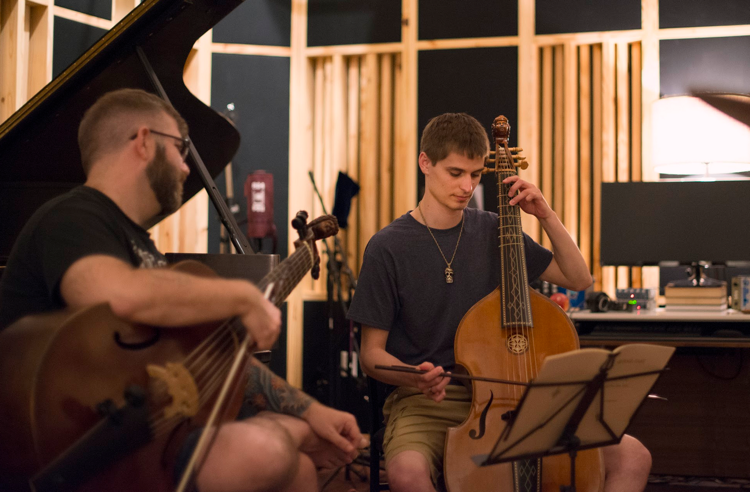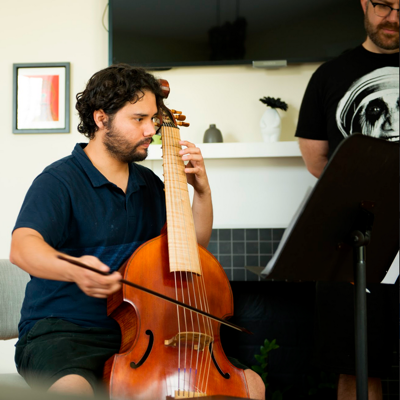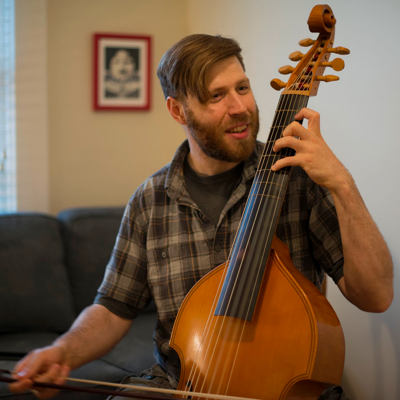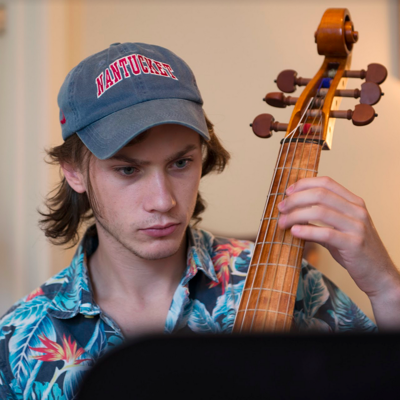
(Photo by Ben Cooper)
By Donald Rosenberg
Josh Lee doesn’t hesitate to pay tribute to the many people who guided him on his career path as a musician, and eventually as a thriving viola da gamba player. They include his middle-school string teacher and noted gambists Catharina Meints and Ann Marie Morgan.
Now Lee is doing something to show his gratitude for what he was given: he has begun holding individual residencies for budding viol players eager to improve their skills and possibly enter the profession. This summer, Lee welcomed four musicians to his home in Jacksonville, Florida, for intensive lessons and conversations about the gamba, early music, and life in the field. The only expense the students incurred was their travel to and from Jacksonville.

Lee, 40, came up with the idea after much soul-searching about the challenges of entering the profession and sustaining a career. He was inspired in part by the Viola da Gamba Society of America Young Players’ Weekend, which he has directed. When he taught these workshops, he said participants always gravitated to him after classes to ask questions.
“You just don’t have enough time in the day to follow through on a lot of the concepts,” Lee said during a phone conversation. “If I do this one on one, there’s no limit on how we can follow up and discuss things. It’s a lot of private lessons and breaking it into two- to three-hour sessions a day. Honestly, you just spend time with the people, whether that’s talking about what my favorite foods to cook are or hardcore performance practice issues or how do you make a career in this field.”
The gambists who made their way to Jacksonville this summer to spend quality study time — three to six days — with Lee are unanimous in their praise of his generosity and wisdom. “I don’t think I spent a single dollar when I was there, which was incredible,” said Colton Hodge, 21, who studies at Sheridan College in Sheridan, Wyoming, and began to play gamba only last fall. He clicked with Lee partly because both started on other instruments — Lee the double bass and Hodge the guitar — before coming under the spell of the viol. “Hearing his story and seeing where he’s gone with the instrument and how absolutely incredible he is at his playing is really inspiring. It makes me definitely want to play the viol all day.”
Edder Rivera has been playing gamba for two years. He is a teacher and freelance cellist who studied at Florida National University in Miami, where he grew up. He realized he might be able to ramp up his viol abilities after he heard about Lee through the Viola da Gamba Society Facebook page. “I haven’t had the right guidance, so to speak, to really immerse myself in this music,” said Rivera, 32. “I’m doing my classical thing. But Josh made this such a beautiful thing. It really blossomed my interest in early music. It was an experience I really needed. I feel at this point I can actually study more and be a part of the community in terms of early music. He gave me the confidence I was looking for.”

Since Lee entered the profession two decades ago, he has performed with many top early-music ensembles. But in recent years, he said he felt he was starting to burn out. He needed to “reconnect with music and the viol in a way that will put the wind in my sails for 20 years.” One of those ways, he determined, was teaching. “Helping young people is a big thing for me. When I was that age, people helped me a lot, whether that’s my gamba teacher at Peabody giving me free lessons or Lloyd Smith from the Philly Orchestra giving me a gamba. I still use that. I’m at the point career-wise where I can help other people. The best way to combat burnout is to reconnect with your art in the most positive way. Music’s stressful.”
Which may be one reason Lee has structured his residencies to be virtually stress-free for the participants. They stay in his guest house complete with food of their choice and ample time to practice or head to the beach — when they’re not engrossed in lessons on technique and interpretation with Lee. Eric Miller, a Suzuki cello instructor and part-time public school teacher in Madison, WI, particularly savored the sessions devoted to gamba repertoire.
“I’ve mostly been a self-taught player on the gamba,” said Miller, 33, who took up the instrument in 2006. “I spent a long time kind of working through my music on my own and figuring it out by looking at the score and listening to recordings. This last year I’ve been focusing on solo repertoire. It’s really valuable to play it for someone as experienced and creative as him.” Miller found the sessions with Lee “valuable to polish this music I’d been working on to a higher level. I think teaching can be really exhausting. I was really impressed with how much energy he had putting his mind into the music and thinking about it in a problem-solving kind of way. He also had a lot of interesting thoughts on performing and teaching.”
With each of the students, Lee worked on phrasing and bowing, which on gamba is used with economy. Benjamin Bossert, a 20-year-old student at the University of Louisville majoring in double-bass performance, said Lee helped him improve his playing both on his early and modern instruments. “They have almost the same fingerings for the most part, but they’re just different enough to screw me up now and then,” Bossert said. “Playing the big instrument, you have to use more weight and force. Basically, I was playing my gamba too forcefully, like it was a bass. Also, learning to play gamba and playing lightly is helping with my bass technique, which, when you press too hard, chokes the sound. I feel like learning the gamba has increased my ability to learn new stringed instruments.”

The four initial recipients of Lee’s artistic largesse expect that their experiences in Jacksonville will lead to more concentration on viola da gamba. Hodge said Lee has been especially sympathetic to the financial pressures young musicians face, having experienced similar challenges as a student. In March, Hodge plans to audition at McGill University to study with Betsy MacMillan. He created a page on GoFundMe to raise money for the trip to Montreal. Someday, he hopes to possess his own gamba. “I don’t even have an instrument,” he said. “I’ve been using the school’s instrument. They allowed me to take one home for summer and winter break. In Florida, I played one of Josh’s viols.”
Lee is able to hold the residencies due to his experience and prosperity both in early and new music. “My partner, Ben Cooper, works under the name Radical Face,” he said. “Ben and I have been working together for four years musically and have enjoyed a good bit of commercial success as far as placing music we’ve worked on together in advertising, TV, and film. We did a Jaguar ad campaign that has a lot of viol on it. That success has afforded me to say I can do it.”
Based on the success of the first series of residencies, Lee hopes to expand them, perhaps with colleagues helping out. He said the program “can’t just be for the hot shots, not just the conservatory grads wanting to be soloists. It’s not just life at the top that matters. It’s from the amateur to the beginners to the people who go to the concerts and those who don’t touch it.”
As he discusses his vision, Lee circles back to the musicians who gave him so much. “That’s the whole point of why I’m doing this. Those people did that for me. They changed my life, they saved my life and put my life into a different place. I hope I can repay that. This is something deeper than just the music. It’s almost paying back a spiritual or societal debt.”
Donald Rosenberg is editor of EMAg, the Magazine of Early Music America.

